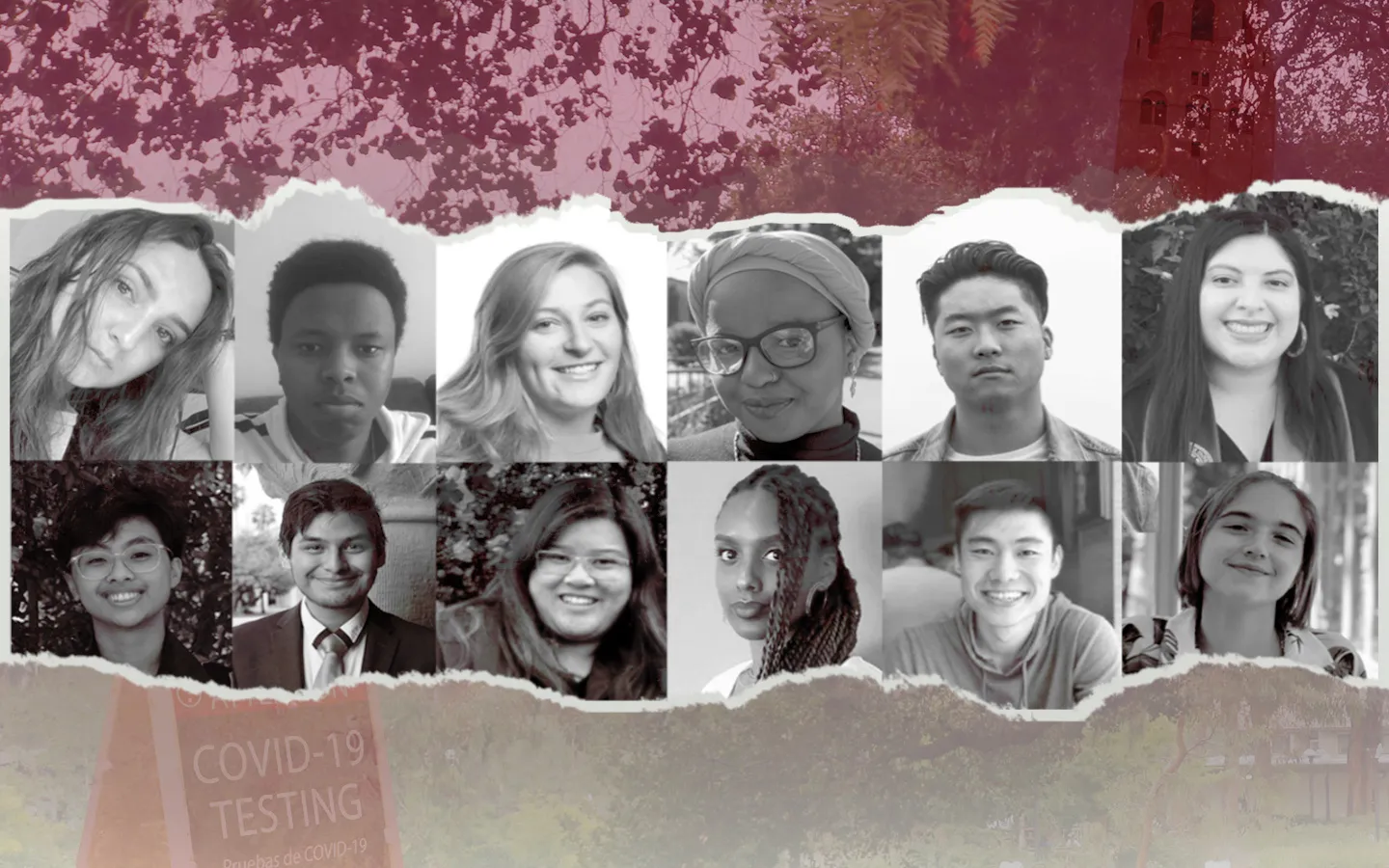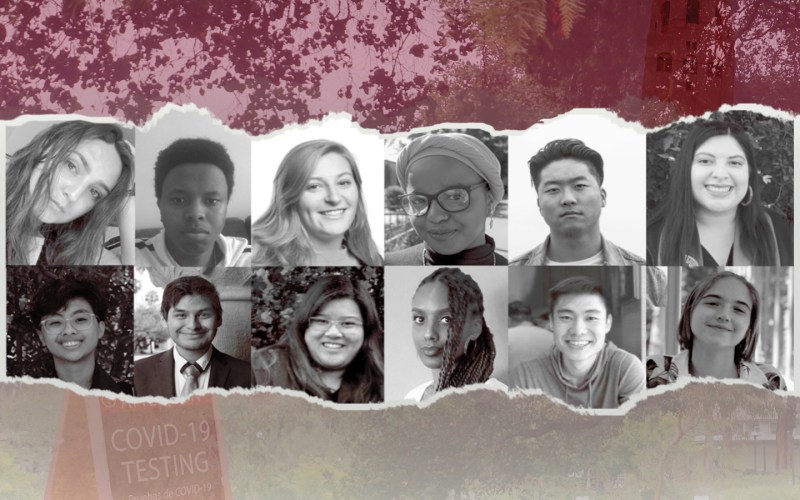Left behind: How COVID-19 impacted Stanford’s FLI community

Graphics by Amy Lo. Photos by Daniel Wu and courtesy of interviewed students.

COVID-19 posed devastating challenges for Stanford’s student body, and among the worst affected were the University’s first generation low-income (FLI) students. For many, Stanford’s shutdown in March began a months-long ordeal as students struggled with the costs of a sudden move off-campus, unstable housing and family situations and the emotional toll of living through a pandemic. The Daily spoke to members of the FLI community to document their experiences, and ask whether the University was able to sufficiently support them.
This is the second in a two-part series. See the first part here.
This is the second in a two-part series. See the first part here.
Part 2: A community rallies
Students Step Up
As Stanford’s COVID-19 plight worsened, much of Stanford’s undergraduate population balanced the pressure of finals with the logistical and financial challenges of an unplanned move out. Among those worst affected were Stanford’s first generation low-income (FLI) students. Amid the chaos, several students and campus communities stepped up to organize mutual aid for the student body, offering a lifeline of support. Student leaders, some of whom are FLI themselves, struggled to balance their own needs while coordinating mutual aid efforts.
At 1 a.m. on March 13, just hours before the University announced that students would have to leave campus, Will Shan ’22 had an idea. As peer institutions began to close their doors, Shan sought a way to support students who’d be hardest hit if Stanford closed. Shan compiled a spreadsheet allowing students to request and offer help, from airport rides to housing.
Will Shan


Class of 2022
Undeclared
From California
“I saw a similar spreadsheet at UChicago… and so I made a copy of that and refanagled it a little bit to meet what I thought were Stanford’s needs. And honestly, it was kind of bare bones at the beginning. It was really simple.”
“I was thinking it would be a quick stopgap measure for people to share things like suitcases and airline miles, you know, things like that.”
Later that Friday, the University warned students that they might experience further disruption as Santa Clara County announced new public health guidelines. Five hours later, the University confirmed some students’ worst fears — students on campus would need to leave. Promptly, First Generation Low Income Partnership (FLIP) co-presidents Daniella Caluza and Kiara Bacasen began a spreadsheet of their own to tackle a longer-term concern: housing for spring quarter.
Daniella Caluza


Class of 2021
CSRE and Symbolic Systems
Former co-president of the First Gen Low Income Partnership (FLIP)
From California
“We would have alumni offer housing through a form … Students would also fill out that form to indicate what they needed, so it was just questions around how long will you need housing, are you looking for housing in a specific area, how many of you need housing if you’re trying to coordinate with a group.”
“We would match whatever [community housing] offers worked best with what students needed.”
Among the alumni who offered their homes was Amy Morgenstern J.D. 2009. She was shocked to discover that Caluza and Bacasen had taken on the task of coordinating housing for students in need.
Amy Morgenstern


Stanford Law 2009
Hosted a Stanford student through FLIP’s housing match
From California
“I was so outraged when I realized I was dealing with a child. I cannot believe that the University didn’t have someone assigned to making sure that these people had somewhere to go.”
Though Stanford did not organize a direct housing match, a few days after the move-out announcement, the University announced opportunities to receive financial aid for housing and transit. A March 20 update on the Stanford Health alerts site told undergraduates that “for those students on need-based aid who are unable to return home but must pay rent elsewhere, financial aid packages are being further adjusted to account for those expenses.”
By mid-April, Caluza and Bacasen matched over 40 students in need of housing with alumni volunteers. The effort took a toll on Caluza, who was preparing to move out herself.
Daniella Caluza


Class of 2021
CSRE and Symbolic Systems
Former co-president of the First Gen Low Income Partnership (FLIP)
From California
“The hardest part was trying to balance advocating for a community I care about with my own thing… I was spending hours a day matching students to housing prospects while sort of bracing myself to go home.”
As FLIP leadership kicked off a housing match service, mutual aid efforts began to spring up all over campus. In Columbae, a student-run co-op, financial officer Nani Friedman ’23 saw an opportunity to use the house’s social dues — funds that had already been collected and would no longer be needed.
Nani Friedman


Class of 2020
Urban Studies
Former Financial Manager of Columbae co-op
From California
“About two hours after the University announced the closure and deadline to leave, I announced to Columbae over GroupMe that we would be giving all of our discretionary funds to FLI students who need support in making their plans.”
“I was able to use our discretionary or ‘social dues’ funds, not money from the University, but the funds we use to host parties, support activism groups on campus, etc. … This totaled about $3,350.”
“I got over 350 texts within the first night of people requesting assistance.”
At the same time, Shan’s spreadsheet — now named Stanford Community Offerings/Resources — took off.
Will Shan


Class of 2022
Undeclared
From California
“The first 24 hours didn’t even get that much traction … then 24 hours later … there were like, hundreds of submissions coming in.”
At Columbae, Friedman scrambled to adjust as demand for her fund soared.
Nani Friedman


Class of 2020
Urban Studies
Former Financial Manager of Columbae co-op
From California
“We had about six people as ‘fund managers’ to keep everything going, and had 83 volunteers help distribute the money over Venmo.”
As requests poured in, the Undergraduate Senate — normally responsible for allocating funds to student groups — sought to join in the support efforts. Senate Chair Munira Alimire soon hit a roadblock.
Munira Alimire


Class of 2022
Anthropology and Urban Studies
Former ASSU Undergraduate Senate Chair
From Minnesota
“Quickly I found out that we can’t donate money to anything because we’re a nonprofit. There’s federal regulations; we can’t just give things without having receipts and everything. So we started to figure out like we can’t give people money, but we can buy things for people. We just fronted everything by card.”
The ASSU covered rides to the airport and meals as the University shut down kitchens in student self-ops and co-ops. Senators kicked off the fund with $10,000 from the ASSU’s more than million dollar reserve. Soon after, student groups pitched in with money they no longer needed.
Munira Alimire


Class of 2022
Anthropology and Urban Studies
Former ASSU Undergraduate Senate Chair
From Minnesota
“How about we coordinate with club leaders and get them to donate their ASSU funds? It wasn’t something that I was even thinking about until Bella Khuu, who was a member of Splash … was like, ‘Hey, I’m a FLI person on this board and this money is not going to go anywhere else.’”
“We’re like, ‘Boom, we can redirect money from … all these big groups that have all this money that they’re not doing anything with.’”
As mutual aid efforts grew across campus, separate groups joined together to coordinate efforts and increase their impact.
Nani Friedman


Class of 2020
Urban Studies
Former Financial Manager of Columbae co-op
From California
“We were in conversation and collaboration with ASSU from the beginning, especially with Munira Alimire within the first day. Once the ASSU fund started a few days later … we worked to advertise them together.”
Friedman and Alimire were soon joined by Shan.
Will Shan


Class of 2022
Undeclared
From California
“For I think, at least a week and a half, we had daily meetings, like at 2 p.m. every day because things were changing so fast.”
Munira Alimire


Class of 2022
Anthropology and Urban Studies
Former ASSU Undergraduate Senate Chair
From Minnesota
“When we were able to bring all that together, [ASSU President Erica Scott ’20] was able to put out all that information to every single student on campus very quickly. I think the most impressive thing with the COVID stuff was that we were very coordinated. Like, the student body had everything in one place.”
Altogether, the ASSU Support Fund distributed around $198,000. Friedman’s Columbae fund raised $112,542.

Providing a Lifeline
Upon announcing the University’s closure, administrators said that financial aid would be made available to help students moving off campus. Significant delays in those payments, however, left students stranded and reliant on student-led mutual aid. The efforts of Friedman, Shan and their peers provided a lifeline for many.
Bibiche Keza


Class of 2021
Public Relations Officer for Stanford African Students Association
From Kigali, Rwanda
“They [Stanford] were very considerate with financial aid but our stipends came in three weeks after kicking us out.”
Alexess Sosa


Class of 2021
Human Biology
Former RA, Faisan
From Texas
“Had I been in a more precarious situation, I would have absolutely been screwed.”
Bibiche Keza


Class of 2021
Public Relations Officer for Stanford African Students Association
From Kigali, Rwanda
“The ASSU, the slush fund and FLIP were like my biggest support. I don’t know how I would have gotten through those three weeks.”
Jessica Reynoso


Class of 2020
From Woodlake, California
“I found out about the Columbae slush fund through Instagram and ASSU funds through emails… I remember applying right during the time when everyone was freaking out and buying things in bulk to stock up for quarantine.”
“I used the funds to buy groceries and things we needed at our house like soap, cases of water, toilet paper. I remember feeling really scared and hopeless during that time and having financial support from folks at Stanford meant the world to me.”
While students used community aid to address their most pressing needs, some rushed to give back to their peers as soon as their own situations became stable.
Alexess Sosa


Class of 2021
Human Biology
Former RA, Faisan
From Texas
“I initially took from the slush fund but once I was in a stable situation I tried to give back to as many of the community funds as I could.”
“I reached out to some mutuals on Twitter that I knew were part of the FLI community and was just like, ‘Hey, I’m not taking my spot but I read your tweets and know how much you need this. I’d like to put your name on a list to give them [to University administration] and then helped folks that way.’”
The University’s Financial Aid Office stated that it would either refund travel expenses or provide a travel allowance equivalent to half of a standard one year allowance.The University also made a Stanford credit card available for ticket purchases. A March 15 email explained that students on full financial aid could expect support for living expenses. The email also clarified that students receiving financial aid for tuition alone could not expect aid for living costs. A March 17 email linked to a survey tracking students’ post-moveout plans. Beyond the assistance for ticket purchases, the Financial Aid Office wasn’t able to disburse aid before the official start of spring term, March 29th.
Correspondence from the Financial Aid Office: We’re writing to all spring quarter financial aid recipients to confirm your initial spring quarter housing plans and identify the individuals in greatest need…For those who are off campus and able to stay with family or friends rent free, your aid will be adjusted to reflect the fact that you don’t currently have a housing expense. We do recognize that even if you are living at home you still have expenses for food and other basic necessities and will continue to consider those costs. For those who are unable to return home or aren’t in a rent-free situation, we recognize that in addition to food and other necessities your will have housing costs and want to take those into consideration. You can only submit the survey once. If you need to wait a day or two to get us the best information that is fine, but please submit as soon as possible.
Jess Dominick


Class of 2022
Engineering Major
Incoming co-president of the First Gen Low Income Partnership (FLIP)
“There was a time where I requested the minimum amount from the slush fund because at that time I was worried about back home… This was before they [the University] said, ˜Oh, we’ll pay for your rent.”
“I felt so bad about requesting money. And I was so scared at the time. Since then, I’ve donated money back now that the University has given us more money… I didn’t need that funding anymore.”
Munira Alimire


Class of 2022
Anthropology and Urban Studies
Former ASSU Undergraduate Senate Chair
From Minnesota
“I slept for like 36 hours when I got home because it was just so much. Literally, I would wake up and work from like 9 a.m. to 9 p.m. and then I’d go to one of my friend’s dorms and then cry and help them pack.”
After organizing so frantically to support the student community, many were critical of the University’s own efforts.
Daniella Caluza


Class of 2021
Comparative Studies in Race & Ethnicity and Symbolic Systems
Former co-president of the First Gen Low Income Partnership (FLIP)
From Stockton, CA
“Did you not know that kicking thousands of students off campus would result in many students being like, I don’t have a place to go?”
“It’s not just knowing FLI students’ needs but knowing the needs of the entire student population in general¦ so that whatever the next emergency is, you know what they need ahead of time before you start making big decisions.”
Will Shan


Class of 2022
Undeclared: thinking psychology
Bay Area, CA
“The University could have some sort of town hall where they bring all the people offering any form of institutional support, record it and send out the takeaways to students who need to learn about this stuff.”
Other leaders took stock of the students that had slipped through the cracks.
Munira Alimire


Class of 2022
Anthropology and Urban Studies
Former ASSU Undergraduate Senate Chair
From Minnesota
“I think, a little over half of the students who applied for the ASSU fund were grad students and they would only apply for, like, groceries. And it would be them and their wives, you know? Because they had kids. People would write paragraphs and everything on the form. And it was really, like, heartbreaking. Like, when I got home, I had to take a break from everything, so I just couldn’t do the work anymore.”
This is Part 2 of a series on COVID-19’s impact on the Stanford FLI community. See Part 1 here.
A previous version of this post misspelled the name of Daniella Caluza. A previous version of this post also inaccurately indicated this series had four parts; it has two. The Daily regrets these errors.
Contact Melissa Loupeda at mloupeda ‘at’ stanford.edu.
